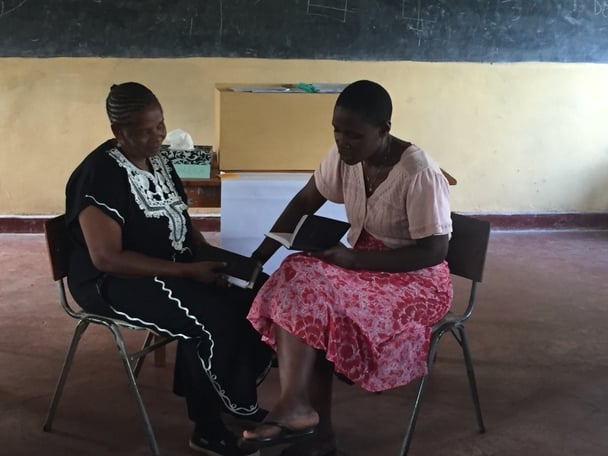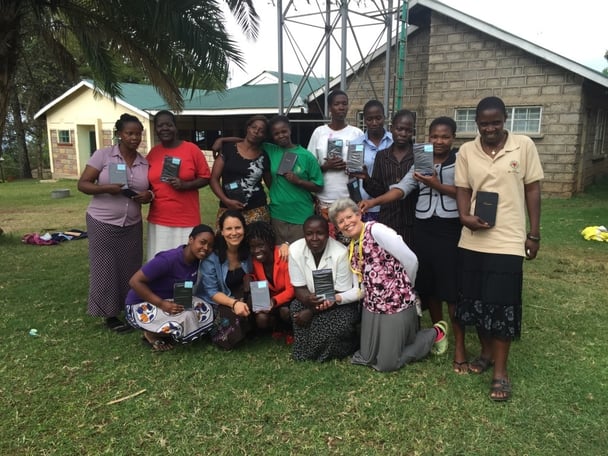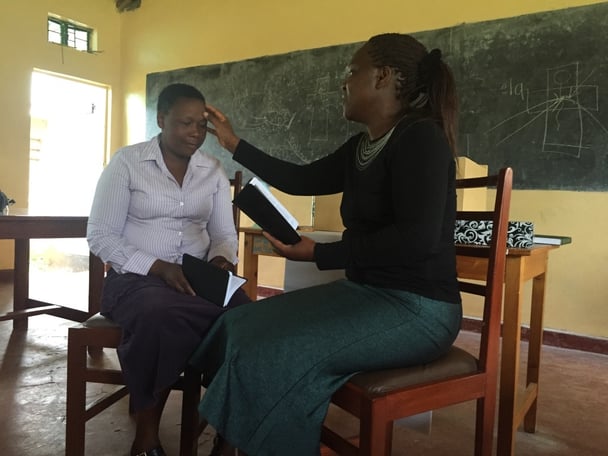In a small town just thirty minutes south of Kisumu, Kenya, is Matongo Lutheran Theological College where, among the other students, we meet thirteen women who are studying to become deaconesses. Some are from various regions of Kenya, and others have traveled the long distances from their villages in Uganda and Tanzania.
On the other side of the world, in northern California, lives Pamela Boehle-Silva, a deaconess and registered nurse, who, since 2006, has traveled to various parts of Asia and Africa to teach and provide care to people in India, Sudan, South Africa, Tanzania, Kenya, and Madagascar. And this past September, Pamela returned to Kenya with an invitation to teach a weeklong class for deaconess students and a two-and-a-half-day seminar for trained deaconesses.
In 2005, Pamela’s colleague Dr. Arthur Just Jr., who at the time was director of deaconess studies at Concordia Theological Seminary in Fort Wayne, traveled to Kenya and saw the devastating impact of HIV/AIDS. The next year, he invited Pamela, who was serving as the parish nurse at her home church in California, to make the trip with him.

Deaconess students Marianna (left) and Rosemary learn how to use the Visitation book to offer comfort to those they serve.
"My encounters with the deaconesses of the Evangelical Lutheran Church of Kenya (ELCK), beginning in 2006, were what led me to consider the vocation of deaconess,” says Pamela, who received her master’s in deaconess studies in 2011 from Concordia Theological Seminary in Fort Wayne. “During that initial visit, I recognized the need to help deaconesses deal with dying and death, as people were dying daily from AIDS. So, in 2008, we returned to teach palliative care. And from that visit, it was recognized that the deaconesses also needed to know how to deal with grief and loss. So, the next year, we returned to teach about grief, loss, and how to counsel.”
And nearly every year since, Pamela has returned. In 2010, in a joint effort with another congregation and the Kenya ministry of health, Pamela taught home-based care—how to care for those with HIV/AIDS, caring for both body and soul. In 2011, she was part of a team that introduced the micro-loan project for deaconesses, hoping to expand it to pastors and others in need. And with every seminar taught, there was always theology—including the Gospel of Luke and the theology of the cross. The next three years, Pamela returned to introduce a clean water project; to date, more than 3,500 people have access to clean water.
This year, Concordia Gospel Outreach partnered with Pamela on her latest trip to Kenya. Upon her arrival, she was able not only to give each woman in her class a copy of the book Visitation but also to leave extra copies with the seminary for future students and pastors. For the women attending seminary in Kenya, a free book to call their own is a “treat” and a “luxury.”
"To purchase books for college is very difficult for Kenyans, especially those attending seminary,” says Pamela. “Most have very little money and owning books is a luxury. To have a book as nice and as useful as Visitation is a treat for them!”
 Together with Deaconess Pamela Boehle-Silva (front row, second from left) and missionary Jan Froh (front, far right), twelve deaconess students display their copies of Visitation.
Together with Deaconess Pamela Boehle-Silva (front row, second from left) and missionary Jan Froh (front, far right), twelve deaconess students display their copies of Visitation.
Pamela introduced Visitation to the women on the first day of classes, and together with missionary Jan Froh, who teaches at Matongo, she demonstrated its use, teaching students how to make the sign of the cross on the forehead of the one receiving the devotion, stressing that the sign of the cross is a visible, tangible reminder of how we are all marked by Christ in our Baptism. And by using this book, the women will have constant access to solid teaching, prayers, and hymns about specific spiritual maladies, such as loneliness, bitterness, anger, despair, and times of sickness, surgery, and dying.
“As deaconesses, we often walk into situations that feel hopeless and despairing, and pray that we can bring Christ’s light into these situations,” says Pamela. “And the deaconesses of the ELCK face their own poverty and need.”
When compared to serving in the United States—where deaconesses have more resources at their disposal, such as modern transportation, health care, running water, electricity, and food to eat—the deaconesses in Kenya face a harsher reality. They often have to walk miles and miles just to reach someone in a rural village; still others provide those they serve with food from their own meager rations, even going without food so they can give to someone else in need. And because of the HIV/AIDS epidemic, these women live in a country with thousands upon thousands of orphans. They try to care for them in ways they are able, but they are also caring for widows, elderly grandparents, and the multitudes of others affected with HIV/AIDS. Nevertheless, the thirteen women attending Matongo are preparing to joyfully serve as women of mercy in their own corners of the world.

Deaconess students Alice (left) and Callen use their Visitation books as they practice making the sign of the cross.
Visitation is a comprehensive book of devotions that the deaconesses will carry with them and read from as they serve those in need, sometimes reading it in English and other times using it as a foundation and translating accordingly. Pamela explains that through its sound theological teaching, ease of use, and wide variety of topics, the book is one the women will take back with them to their remote villages and use often.
“I was so happy to receive the Visitation books, as were the women in Kenya,” says Pamela, reflecting back on her time in Kenya. “It was a win-win!”

